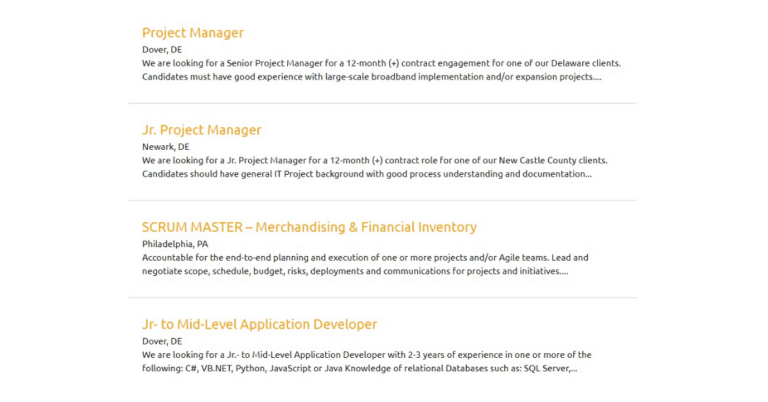I have a confession. I LOVE Social Media. I know, it’s totally basic, but I do. I think it’s awesome that celebrities/authors/business leaders will retweet you, that we can see Instagrams from all over the world, and that you can keep up with literally everything on your Facebook news feed. However, how does that impact our job searching or work life? Let’s take a look, and learn how to make it work for you!
Have you seen the new feature on some job boards where you can link your social media accounts? I feel this is an oft overlooked addition to any profile – it’s easy to check a box, but that’s a lasting change. How many times do we tweet or post without REALLY thinking about the impact? Have you ever posted something that you eventually regret? Have you ever thought of the implications of your tweets and Facebook posts?
Nothing is private these days – especially on the internet. Almost everyone has at least one form of social media account. There are over 2.1 billion social media accounts across the various platforms*. Instagram, Facebook, Twitter, it’s all searchable online. Even LinkedIn profiles count. Regardless of the platform, an irrefutable piece of advice is to think about what you post. It’s fine to have conversations with friends on various issues, but make sure you’re being smart about what you post. If you are applying for a position with a specific company, make sure you’re not directly – or indirectly – bashing them. For example, if you want to go work for Pepsi, but hate their soda… it’s probably not the best fit. Obviously, this is a silly example, but you’d be surprised what I’ve seen. Even deleting things doesn’t ensure they’re gone forever. Number one rule: don’t bash your job. Period. I see stories quite often about how someone said something derogatory about their job/company/boss on some social network – only for it to get back to them and for that person to suddenly find themselves without a job.
On to the various platforms. Obviously, there are a lot more, but I’ve chosen to highlight those that are the most popular, and widely recognized.
This is the best social network for the work world. It’s also one of the oldest, dating from 2002, with 347 million users*. I encourage everyone to create a profile! However, if you take the time to start a profile, make it as complete as possible. This is a networking tool and in order to be successful, you have to put some work in.
- Picture: try a professional headshot, or a picture where you’re looking at the camera. If it’s a candid photo, try to be the only one in the shot. And make sure it looks like you! I’ve met candidates before and taken a look at their profile picture to know who I’m meeting – and then it turns out it’s an old picture, or just a really bad one. Also, make sure it actually IS you! Flowers, cartoon characters, emoji’s, and motivational quotes aren’t professional. Save those for the other sites.
- Job History: a common trend lately is for an employer to compare your resume and your profile. Make sure you have the dates right, make sure you have the same titles listed. You don’t have to fill in all the details of what you did, but ensure you’ve listed all your positions.
- Education: again, sometimes it’s more important than other times, but if you have a degree, list it. If you’ve taken courses toward a degree, clarify that. Also, make sure you add in organizations, sports, or other clubs you were in. You never know what might be a commonality with your interviewer, recruiter, or hiring manager – I’ve seen people get jobs by going to the same school or being in the same society as someone at the company.
- Skills: add all the relevant skills into your profile. LinkedIn has a Recruiter function and it’s really easy for a recruiter to search for a specific skill and find your resume.
- Connect: take a look at the “People You May Know” section at the top of the page. Sometimes these aren’t relevant, but you can find people you know from previous jobs, school, organizations, and through your email contacts. These people become your network – and can help you find your next job!
- Recommendations: consider them online references. I take the time to read recommendations – both given and written – and can sometimes use them to a) find candidates or b) evaluate skills. When someone asks, be honest and specific. When asking, ensure you specify what type of recommendation you are seeking.
- Volunteer Work: Especially if you use the same skills as in your professional career, volunteer positions can be very helpful. It shows that you care about others and gives insight into what type of person you are. Also, it’s a way of connecting with others, or having an “in” with a particular company or for a certain job.
- Follow Companies: Most companies have a social media person these days. Take a look at who works there, what they do, what awards they’ve won, and the stories they have posted. It helps to have looked at their postings prior to an interview so you can give them an assurance that you’ve done your homework. You don’t have to like or comment on all of their posts, but it’s a good idea to peruse.
At last count, there were over one billion* Facebook users! Between companies, fan pages, and individuals, most everyone is on Facebook. Be mindful of who your friends are – and who they know. It’s getting easier to find information about others. I’m friends with some of my coworkers and I’m conscious of how my posts could get back to my company – and what that might mean for my career.
- “Like” your job: On the positive side, you can promote your job, or make yourself stand out to potential employers, by “liking” their company page.
- Fill in your “About” information. Facebook can help you find friends who work in similar industries, companies, went to the same school, etc. While not as professional as LinkedIn, I know people who have made great connections and have landed exciting jobs through Facebook.
They say “a picture is worth a thousand words”, but a picture can also be the difference between getting a job offer or not. Instagram is one of the fastest growing social networks, with over 300 million monthly users*. Keeping your Instagram private helps some, but not always. My one word of advice is just don’t do anything illegal and capture it on film. I cringe with some of the things I see on people’s Instagram. Keep it PG – and inoffensive. If you do something illegal (or that was illegal at the time) and it makes it onto the internet, it’s there forever. I’ve heard of people losing out on job offers because of some picture that they thought was private. There is a setting in the options menu (on the app, not the website) where you can make your account private. I’m sure somewhere there’s a hack around that, but it’s a thought if you must have inappropriate pictures – or otherwise sensitive content.
You can say a lot in 140 characters (and hashtags). And venting isn’t as anonymous as it used to be. PSCI follows both of my twitter feeds – personal and professional (you can follow our company at @PSCI). You never know who’s going to read your tweets, just keep that in mind. Even if they don’t necessarily follow you, they can still see your tweets – unless you click the Protect my Tweets box in the settings menu. Even the most innocuous things go viral online. People can like, share, and comment – and with 284 million users worldwide*, your message can end up half way around the world in minutes.
Snapchat
Once a haven for teenagers to send short temporary messages to each other, now Snapchat has 100 million monthly users* and businesses are getting accounts available to everyone. Did you know that others have the ability to capture your Snapchat? Random venting and short-lived jokes can now make it into the permanent record with the press of a button.
When you’re job searching, take time to look at your potential employers social media pages! If they’re on the bandwagon, they’ll regularly update the things they are doing – both internal projects and external efforts (affiliations, volunteering, and accolades) – and make sure they are a company you want to work for! It takes no time at all to “like”, “favorite” or comment on a post, and it can go a long way in helping you obtain your dream job!
To summarize, everyone has opinions. One of the great things about America is that we don’t all have to agree on things – we will however, argue our point until we’re blue in the face, or our fingers fall off! But just think before you type – or tweet, or post. Remember those who have lost jobs because of what they’ve done – you don’t want that hanging over your head for the rest of your life! Good luck and share wisely!
*All statistics gathered from: http://www.jeffbullas.com/2015/04/08/33-social-media-facts-and-statistics-you-should-know-in-2015/.
Image courtesy of photoraidz at FreeDigitalPhotos.net








